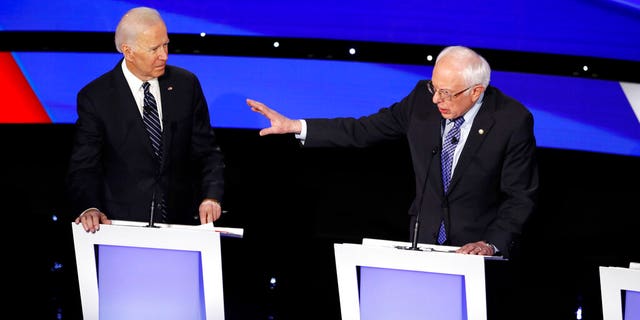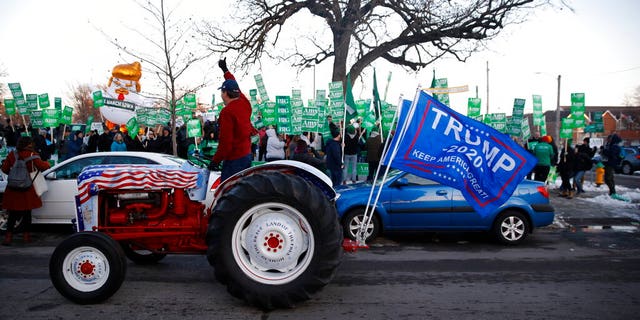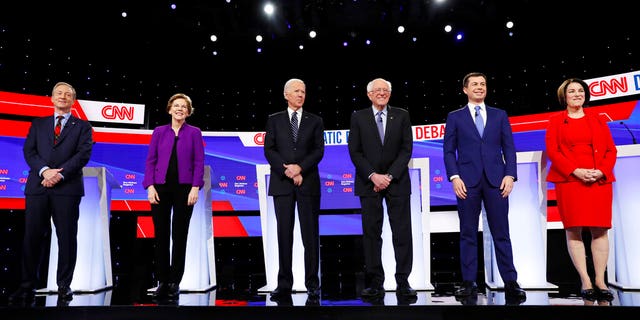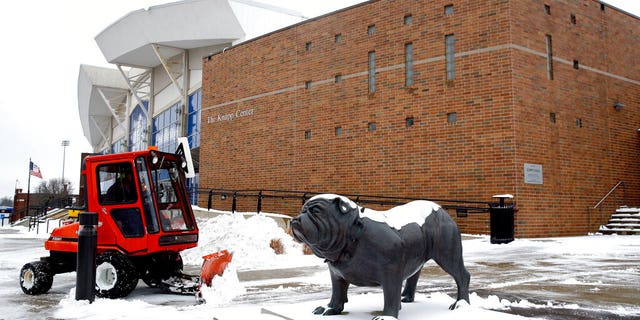The final Democratic presidential
debate before
the pivotal Feb. 3 Iowa caucuses erupted Tuesday night, as Bernie Sanders and Elizabeth Warren sparred over the disputed reports that Sanders had privately told Warren in December 2018 that a woman could not realistically become president.
“Well as a matter of fact I didn’t say it," Sanders insisted, when one of the CNN debate's moderators asserted the conversation had occurred.
"That is correct," he flatly said later, when asked whether he was still unequivocally denying that the conversation took place. Bizarrely, a debate moderator then immediately and matter-of-factly asked Warren, "What did you think when Senator Sanders told you a woman could not win the election?"
That prompted laughter in the debate hall at Drake University in Des Moines, and a bewildered chuckle from Sanders. Some commentators have suggested the
CNN report of Warren and Sanders' alleged 2018 conversation, which
cited sources who were not present for Sanders' alleged remarks, was a leak from the Warren campaign intended to blunt Sanders'
surge in recent polls.
Sanders reiterated that he would do "everything in my power" to help a woman candidate win the presidency, if she secured the Democratic nomination. Warren, in turn, outwardly sought to deescalate the situation, but went on to argue that the issue raised larger questions and again claimed Sanders had made the remark.
"Bernie is my friend and I’m not here to try to fight with Bernie," Warren began, before saying it was important to take the issue of sexism "head-on."
"Can a woman beat Donald Trump? Look at the men on this stage," Warren said to applause. "Collectively, they have lost ten elections. The only people on stage who have won every single election they've been in are the women. Amy and me. And the only person on this stage who has beaten an incumbent Republican anytime in the past 30 years is me. And here's what I know -- the real danger that we face as Democrats is picking a candidate who can't pick our party together."
Sanders quickly challenged Warren's assertion, noting that he won an election against a GOP incumbent in November 1990, when he unseated then-Rep. Peter P. Smith.
"And I said I was the only one who has beat an incumbent Republican in 30 years," Warren shot back -- even though Sanders' win was, in fact, within the past 30 years.
The brouhaha smashed the more than yearlong non-aggression pact between the two candidates, and was just one of several flashpoints between the two that emerged during the debate. As the event concluded, Warren
appeared to ignore Sanders' invitation for a handshake.
Sanders had a different foil early on, as he challenged former Vice President Joe Biden's initial support for the Iraq war, which he called "the worst foreign policy blunder in the modern history of this country."
"Joe and I listened to what Dick Cheney and George Bush and [Donald] Rumsfeld had to say," Sanders said. "I thought they were lying. I didn't believe them for a moment. I took to the floor. I did everything I could to prevent that war. Joe saw it differently."
Biden acknowledged that his 2002 vote to authorize the war was a "mistake" but emphasized that former President Barack Obama still felt that he had the foreign policy credentials to serve as vice president.
“I think my record overall, on every other thing we’ve done, I’m prepared to compare it to anybody on the stage," Biden said. He later said he would not meet with North Korea's leaders without preconditions, accusing the Trump administration of being used by the dictatorship there as it seeks "legitimacy."
After the exchange, Sanders' team tweeted out a video from summer 2003 showing Biden's previous support for the Iraq War. ("Some in my own party have said that it was a mistake to go in to Iraq in the first place and believe that it’s not worth the cost,” Biden said in the video. “But the cost of not acting against Saddam I think would have been much greater.”)
Former South Bend, Ind., Mayor Pete Buttigieg, who served in the war in Afghanistan, added: “The next president is going to be confronted with national security challenges different in scope and kind than any we have seen before. ... For me, those lessons of the past are personal."
Democratic presidential candidate former Vice President Joe Biden, left, watches as Sen. Bernie Sanders, I-Vt., answers a question Tuesday, Jan. 14, 2020, during a Democratic presidential primary debate hosted by CNN and the Des Moines Register in Des Moines, Iowa. (AP Photo/Patrick Semansky)
Buttigieg and Minnesota Sen. Amy Klobuchar later said they would ensure that Iran never obtains a nuclear weapon, but emphasized that joint action among allies would be necessary.
The party's top six
contenders were squaring off amid a pending Senate impeachment trial as well as the
white-hot tensions between Warren and Sanders.
Early on, Warren and Sanders disagreed over the USMCA trade pact, which Sanders said he opposed in part because of "climate change" concerns -- even though the AFL-CIO and other powerful progressive interest groups have supported the deal.
"I will not vote for a trade agreement that does not incorporate very very strong principles to significantly lower [carbon emissions," Sanders said. He went on to forcefully tell Biden that he was "sick and tired" of the corporate influence over such trade deals. ("We need to have corporate responsibility," Biden responded, which he argued was achievable through appropriate "enforcement mechanisms.")
“We can do much better than a Trump-led trade deal," Sanders asserted.
A Trump supporter rides by Democratic presidential candidate Sen. Amy Klobuchar, D-Minn., rally before a Democratic presidential primary debate Tuesday, Jan. 14, 2020, hosted by CNN and the Des Moines Register in Des Moines, Iowa. (AP Photo/Patrick Semansky)
For her part, Warren said during the debate that the deal was a "modest" improvement, but still a worthwhile one, especially for Iowa farmers who have been hit by the ongoing trade war with China: “We get up the next day and fight for a better trade deal," she said.
The fireworks were fueled, in part, by the tighter debate stage. Several previous crowd favorites didn't return Tuesday night, which also marked the first forum with an all-white lineup.
Businessman Andrew Yang, an Asian American candidate who appeared in the December debate, failed to hit the polling threshold for Tuesday's event.
From left, Democratic presidential candidates businessman Tom Steyer, Sen. Elizabeth Warren, D-Mass., former Vice President Joe Biden, Sen. Bernie Sanders, I-Vt., former South Bend Mayor Pete Buttigieg, and Sen. Amy Klobuchar, D-Minn., stand on stage, Tuesday, Jan. 14, 2020, before a Democratic presidential primary debate hosted by CNN and the Des Moines Register in Des Moines, Iowa. (AP Photo/Charlie Neibergall)
And New Jersey Sen. Cory Booker ended his campaign on Monday after he didn't make the debate stage, leaving just one black candidate — former Massachusetts Gov. Deval Patrick — in the race.
Billionaire Tom Steyer, however, remained on the stage, despite criticism that he's trying to buy his way to the White House in part by spending more than $100 million of his own money on television advertisements for his campaign. He told the debate audience that he didn't inherit significant money from his parents and built his business empire by himself.
He announced he would declare a "state of emergency" over climate change, focus on "environmental justice" and involve "black and brown" people in his decisionmaking.
"I divested from fossil fuels," Steyer insisted, when reminded by a moderator of his oil and gas investments. “I have a history of over a decade of leading the climate fight.” He said his climate program would be the "biggest job program in American history."
Warren then claimed "climate change threatens every living thing on this planet,” and vowed to halt offshore drilling and drilling on federal lands.
Not to be outdone, Sanders dialed up the pressure, saying an "uninhabitable" planet was imminent, and that Australia was "burning." (Police have linked
dozens of arsonists to the wildfires there.)
Also imminent was the House's scheduled vote Wednesday to finally advance articles of impeachment to the Senate, after weeks of posturing by both parties. Steyer quickly reminded viewers that he has spent years organizing volunteers to sign petitions for Trump's impeachment.
"What I've done is to organize a petition drive of over 8.5 million Americans to say this president deserves to be impeached and removed from office," Steyer said.
Warren added that the pending Senate impeachment trial will further expose the Trump administration's "corruption" and desire to "help himself" using the power of his office.
A statue depicting Drake University's bulldog mascot stands outside a university venue that will host a Democratic presidential primary as workers clear snow, Monday, Jan. 13, 2020, in Des Moines, Iowa. The debate is scheduled for Tuesday. (AP Photo/Patrick Semansky)
The showdown took place as
the latest polls indicate a very close contest among former Biden, Sanders, Warren and Buttigieg both in Iowa and New Hampshire, which holds the first presidential primary in the White House race just eight days after Iowa’s caucuses.
Surveys in both states show plenty of voters remain undecided or willing to change their minds on whom they’re supporting.
“All the polling data that I’ve read and seen is … it’s a toss-up,” Biden told campaign volunteers at a Des Moines field office on the eve of the debate.
Fox News' Paul Steinhauser in Des Monies, Iowa, and The Associated Press contributed to this report.









 কি, অবাক হচ্ছেন! মাছের খাদ্য হিসেবে ঘাস
কি, অবাক হচ্ছেন! মাছের খাদ্য হিসেবে ঘাস মুজিবনগর কমপ্লেক্স মাঠে বাগোয়ান ইয়াং স্টার ক্লাব ৫ উইকেটে মুজিবনগর শাপলা স্বেচ্ছাসেবী ক্লাব কে পরাজিত করেছে
মুজিবনগর কমপ্লেক্স মাঠে বাগোয়ান ইয়াং স্টার ক্লাব ৫ উইকেটে মুজিবনগর শাপলা স্বেচ্ছাসেবী ক্লাব কে পরাজিত করেছে েহেরপুর সদর উপজেলার চাঁদবিলে জাতীয়তাবাদী মৎস্যজীবী দলের লিফলেট বিতরণ কর্মসূচি অনুষ্ঠিত
েহেরপুর সদর উপজেলার চাঁদবিলে জাতীয়তাবাদী মৎস্যজীবী দলের লিফলেট বিতরণ কর্মসূচি অনুষ্ঠিত মনে হয়তো প্রশ্ন আসতে পারে যে গরু ঘাস খায়, কিন্তু মানুষ ঘাস খায়না কেন?
মনে হয়তো প্রশ্ন আসতে পারে যে গরু ঘাস খায়, কিন্তু মানুষ ঘাস খায়না কেন? মেহেরপুর জেলা স্বেচ্ছাসেবক লীগের আহবায়ক বকুলসহ চার জন মুজিবনগরের আওয়ামী লীগ নেতা কে আটক করেছে।
মেহেরপুর জেলা স্বেচ্ছাসেবক লীগের আহবায়ক বকুলসহ চার জন মুজিবনগরের আওয়ামী লীগ নেতা কে আটক করেছে। মুজিবনগর উপজেলার দারিয়াপুর মাঠে শতাধিক পেঁয়াজ চাষীদের মানববন্ধন
মুজিবনগর উপজেলার দারিয়াপুর মাঠে শতাধিক পেঁয়াজ চাষীদের মানববন্ধন মুজিবনগরে ভ্রাম্যমান আদালতের মাধ্যমে ৭টি গাড়ির বারো হাজার টাকা জরিমানা আদায় করেছে
মুজিবনগরে ভ্রাম্যমান আদালতের মাধ্যমে ৭টি গাড়ির বারো হাজার টাকা জরিমানা আদায় করেছে হাঁসের প্লেগ রোগ হলে প্রতিরোধ করার উপায়
হাঁসের প্লেগ রোগ হলে প্রতিরোধ করার উপায় খুলনা বিভাগীয় পর্যায়ে মেহেরপুর জেলা চ্যাম্পিয়ন শোলমারি সরকারি প্রাথমিক বিদ্যালয় ২-০ গোলে নড়াইল প্রাথমিক বিদ্যালয়কে পরাজিত করে সেমিফাইনালে।
খুলনা বিভাগীয় পর্যায়ে মেহেরপুর জেলা চ্যাম্পিয়ন শোলমারি সরকারি প্রাথমিক বিদ্যালয় ২-০ গোলে নড়াইল প্রাথমিক বিদ্যালয়কে পরাজিত করে সেমিফাইনালে। মেহেরপুর পৌরসভার ৮ নং ওয়ার্ড বিএনপির আলোচনা সভা অনুষ্ঠিত
মেহেরপুর পৌরসভার ৮ নং ওয়ার্ড বিএনপির আলোচনা সভা অনুষ্ঠিত গাংনী উপজেলার জুগিন্দা মাধ্যমিক বিদ্যালয়ে নবীন বরন ও বিদায় অনুষ্ঠান
গাংনী উপজেলার জুগিন্দা মাধ্যমিক বিদ্যালয়ে নবীন বরন ও বিদায় অনুষ্ঠান মুজিবনগর উপজেলা পর্যায়ে জাতীয় প্রাথমিক শিক্ষা পদক ক্রীড়া, সাংস্কৃতিক, বিষয়ভিত্তিক কুইজ ও কাবিং অনুষ্ঠিত
মুজিবনগর উপজেলা পর্যায়ে জাতীয় প্রাথমিক শিক্ষা পদক ক্রীড়া, সাংস্কৃতিক, বিষয়ভিত্তিক কুইজ ও কাবিং অনুষ্ঠিত মেহেরপুরে স্যানিটেশন ও হাইজিন বিষয়ক ক্যাম্পেইন উপলক্ষে শোভাযাত্রা করেছে
মেহেরপুরে স্যানিটেশন ও হাইজিন বিষয়ক ক্যাম্পেইন উপলক্ষে শোভাযাত্রা করেছে  মুজিবনগর কমপ্লেক্স মাঠে বাগোয়ান ইয়াং স্টার ক্লাব ৫ উইকেটে মুজিবনগর শাপলা স্বেচ্ছাসেবী ক্লাব কে পরাজিত করেছে
মুজিবনগর কমপ্লেক্স মাঠে বাগোয়ান ইয়াং স্টার ক্লাব ৫ উইকেটে মুজিবনগর শাপলা স্বেচ্ছাসেবী ক্লাব কে পরাজিত করেছে েহেরপুর সদর উপজেলার চাঁদবিলে জাতীয়তাবাদী মৎস্যজীবী দলের লিফলেট বিতরণ কর্মসূচি অনুষ্ঠিত
েহেরপুর সদর উপজেলার চাঁদবিলে জাতীয়তাবাদী মৎস্যজীবী দলের লিফলেট বিতরণ কর্মসূচি অনুষ্ঠিত মেহেরপুর জেলা স্বেচ্ছাসেবক লীগের আহবায়ক বকুলসহ চার জন মুজিবনগরের আওয়ামী লীগ নেতা কে আটক করেছে।
মেহেরপুর জেলা স্বেচ্ছাসেবক লীগের আহবায়ক বকুলসহ চার জন মুজিবনগরের আওয়ামী লীগ নেতা কে আটক করেছে। মুজিবনগর উপজেলার দারিয়াপুর মাঠে শতাধিক পেঁয়াজ চাষীদের মানববন্ধন
মুজিবনগর উপজেলার দারিয়াপুর মাঠে শতাধিক পেঁয়াজ চাষীদের মানববন্ধন কবুতরের ঘাড় বাঁকা রোগের প্রতিরোধ করবেন যেভাবে
কবুতরের ঘাড় বাঁকা রোগের প্রতিরোধ করবেন যেভাবে
No comments: